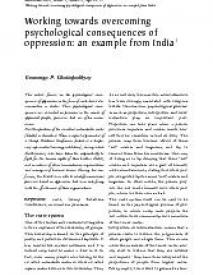Working towards overcoming psychological consequences of oppression: an example from India
This article focuses on the psychological consequences ofoppression in the form f caste-based discrimination in India. These psychological consequences are described as processes in the minds of oppressed people, processes that are often unconscious. First the position of the so-called untouchable castes (Dalits) is described. Then a report is presented of a Group Relations Conference (which is a temporary experiential learning institution), during which Dalit-leaders, who have taken the responsibility to fight for the human rights of their brother Dalits, met executives of other humanitarian organisations and managers of business houses. During this conference, the Dalits were able to identify unconscious processes based on oppression that were interfering with the effectiveness of their organisations. Keywords: caste, Group Relations
Geachte bezoeker,
De informatie die u nu opvraagt, kan door psychotraumanet niet aan u worden getoond. Dit kan verschillende redenen hebben,
waarvan (bescherming van het) auteursrecht de meeste voorkomende is. Wanneer het mogelijk is om u door te verwijzen naar de bron
van deze informatie, dan ziet u hier onder een link naar die plek.
Als er geen link staat, kunt u contact opnemen met de bibliotheek,
die u verder op weg kan helpen.
Met vriendelijke groet,
Het psychotraumanet-team.
Reference:
Gouranga P. Chattopadhyay | 2003
In: Intervention: the international journal of mental health, psychosocial work and counselling in areas of armed conflict, ISSN 1571-8883 | 1 | 3 | 28-37
http://www.interventionjournal.com/sites/default/files/28-37%20Chatto_0.pdf
In: Intervention: the international journal of mental health, psychosocial work and counselling in areas of armed conflict, ISSN 1571-8883 | 1 | 3 | 28-37
http://www.interventionjournal.com/sites/default/files/28-37%20Chatto_0.pdf


